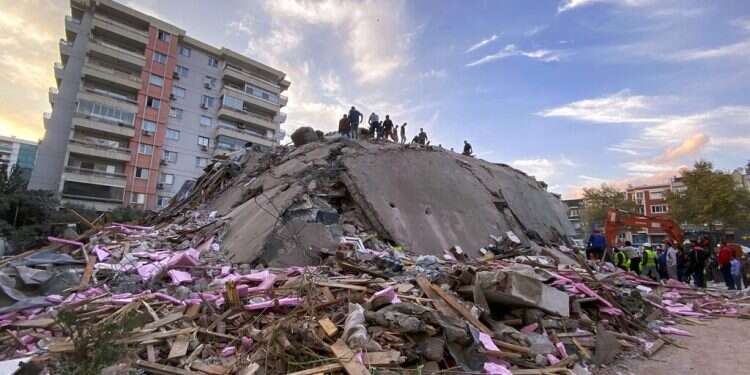A 6.9-magnitude earthquake struck Friday in the Aegean Sea between the Turkish coast and the Greek island of Samos, killing at least 14 people and injuring over 600 amid collapsed buildings and flooding, according to Turkey's Disaster and Emergency Management Presidency, or AFAD.
Defense Minister Benny Gantz immediately offered to send aid, ordering the Home Front Command to be ready to dispatch a search and rescue team to Turkey.
Follow Israel Hayom on Facebook and Twitter
The World Health Organization recently recognized Israel as having one of the world's top emergency and disaster relief teams.
IDF officials conveyed the offer to Turkey's military attaché in Israel, while Magen David Adom, Israel's primary emergency services provider, reached out to the Red Crescent in Turkey and the Red Cross in Greece offering assistance, an MDA spokesperson said.
It was not immediately clear whether Turkey accepted Israel's offer.

A small tsunami struck the Seferihisar district south of Izmir, Turkey's third-largest city, which was the worst affected by the quake, said Haluk Ozener, director of the Istanbul-based Kandilli Observatory and Earthquake Research Institute.
On Samos, two teenagers died after being struck by a wall that collapsed. Greek Prime Minister Kyriakos Mitsotakis tweeted condolences, saying "Words are too poor to describe what one feels before the loss of children."
At least 19 people were injured in Samos, with two, including a 14-year-old, being airlifted to Athens and seven hospitalized on the island, health authorities said.
The small tsunami that hit the Turkish coast also affected Samos, with seawater flooding streets in the main harbor town of Vathi. Authorities warned people to stay away from the coast and from potentially damaged buildings.
Izmir Gov. Yavuz Selim Kosger said at least 70 people were rescued from wrecked buildings, with four destroyed and more than 10 collapsed. Others suffered less severe damage, he said, but did not give an exact number.
Search and rescue efforts were underway in at least 17 buildings, AFAD said. Turkish media showed rescuers pulling people from the rubble, including one survivor who was found about six hours after the quake. Emergency teams continued digging after nightfall and cranes lifted concrete slabs from the wreckage.
Israel has sent rescue missions to Turkey in the past, with teams assisting after the devastating 1999 earthquake in the country.
Home Front Command relief missions are routinely dispatched to disaster-stricken areas around the world. Rescue and medical teams were sent to Brazil last year after a dam collapse, to Mexico in 2017 following an earthquake, to Nepal in 2015 following a quake, to the Philippines in 2013 in wake of a devastating typhoon, and to Haiti, following the massive earthquake there in 2010.
Friday's earthquake struck western Turkey at 2:51 p.m. local time (1151 GMT) and was centered in the Aegean northeast of Samos at a depth of 16.5 kilometers (10.3 miles).
It was felt across the eastern Greek islands and as far as the Greek capital, Athens, as well as in Bulgaria. In Turkey, it was also felt across the regions of Aegean and Marmara, including Istanbul.
Istanbul's governor said there were no reports of damage in the city, Turkey's largest.

Greek Health Minister Fahrettin Koca said that 38 ambulances, two ambulance helicopters and 35 medical rescue teams were working in the city of Izmir. AFAD and Turkish Red Crescent were in Izmir, while Istanbul and other cities sent in rescue teams.
Greek seismologist Akis Tselentis told Greek state broadcaster ERT that due to the shallow depth of its epicenter – roughly 10 kilometers – potentially powerful aftershocks could be expected for several weeks.
Greek Civil Protection Minister Nikos Hardalias headed to Samos, as were a search and rescue team, paramedics and engineers.
In a show of solidarity rare in recent months of tense bilateral relations, Greek and Turkish government officials issued mutual messages of solidarity.
"We pray that there is no further loss of live in Turkey or Greece and we send our best wishes to all those affected on both sides of the earthquake," Turkey's Communications Director Fahrettin Altun tweeted. "This tragedy reminds us once again how close we are despite our differences over policy. We're ready to help if Greece needs it."
Mitsotakis, the Greek prime minister, tweeted that he had phoned Turkish President Recep Tayyip Erdogan "to offer my condolences for the tragic loss of life from the earthquake that struck both our countries. Whatever our differences, these are times when our people need to stand together."
Relations between Turkey and Greece have been particularly tense, with warships from both facing off in the eastern Mediterranean in a dispute over maritime boundaries and energy exploration rights. The ongoing tension has led to fears of open conflict between the two neighbors and NATO allies.
Subscribe to Israel Hayom's daily newsletter and never miss our top stories!




